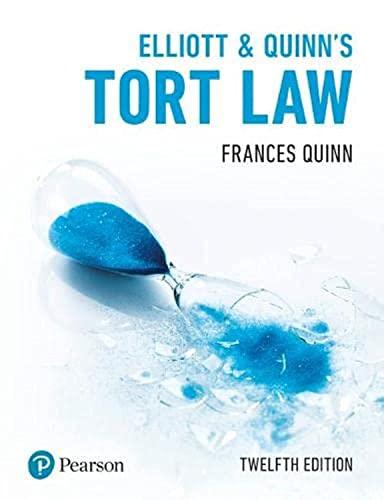Question
home work I need help here is the topic discuss how the legal concepts in the selected case can be applied within a business managerial
home work I need help
here is the topic
discuss how the legal concepts in the selected case can be applied within a business managerial setting. Give an example from real life experiences or current events. Explain how the rule discussed in the case have impacted the industry in past and what you see for the future. Discuss the positive and negative effect the case law has made on the industry.
Facts
One night, Trent DiGiuro, a student athlete at the University of Kentucky, was sitting in a chair on the front porch of his residence celebrating his twenty-first birthday with friends when he was shot and killed. Fragments of the bullet were recovered from DiGiuro's body, and a firearms expert discovered that the bullet had been fired from a .243-caliber rifle.
Six years elapsed after the murder, which was not solved. At that time, Shane Layton Ragland's ex-girlfriend informed the police that Ragland confessed to her that he killed DiGiuro because DiGiuro had caused Ragland to be blackballed by a college fraternity. The witness also told police that Ragland had shown her the rifle he had used to shoot DiGiuro and that he told her he hid the rifle at his mother's residence. Pursuant to a search warrant, the police recovered a Wetherby Vanguard .243-caliber rifle from Ragland's mother's residence with three unspent .243-caliber bullets in the chamber. A police metallurgist fired several recovered bullets and found that they were indistinguishable in metallurgical composition with the bullet that had killed DiGiuro. Ragland was taken into police custody, was interrogated and answered police questions until he eventually asked for an attorney. Ragland stood trial for the murder of Trent DiGiuro. After substantial evidence was produced, including the statements made by Ragland to the police during his interrogation, Ragland was convicted by a jury of murder and was sentenced to 30 years in prison. Ragland appealed, asserting that the statements he made during the interrogation should have been suppressed because he (1) received an inadequate Miranda warning, (2) never waived any of his Miranda rights, and (3) asserted the right to counsel.
Issue
Was defendant Ragland properly given his Miranda rights?
Language of the Court
After obtaining preliminary identification information, Sergeant Barnard of the Lexington police, the lead interrogator, advised appellant of his rights under Miranda v. Arizona.
Miranda does not require a "talismanic incantation" as long as the warnings adequately advise the suspect of his Miranda rights. Nor do the warnings have to be in writing, much less audiotaped or videotaped. The trial court's finding that appellant voluntarily waived his Miranda rights was supported by substantial evidence.
Later in the interrogation, appellant did request an attorney, and the trial court properly suppressed any statements he made after that request.
Decision
The supreme court of Kentucky held that appellant Ragland had been read his Miranda rights properly and had waived his right to an attorney. Thus, any statements he made during the interrogation, up until the time he clearly asked for an attorney, constitutes evidence that was properly admissible at his trial.
Note
- Trent's father, Michael DiGiuro, on behalf of his son's estate, filed a civil lawsuit for the tort of wrongful death against Ragland. After a jury trial and appeal, DiGiuro was awarded $3,341,708 in compensatory damages and $30,000,000 in punitive damages against Ragland.
Ethics Questions
- Do you think that Ragland understood his Miranda rights when he answered the interrogators' questions? Do you think many suspects answer questions during interrogation when they should have pleaded the Fifth Amendment privilege to avoid incriminating themselves and demanded a lawyer? What have you learned from this case?
Attorney-Client and Other Privileges
To obtain a proper defense, an accused should tell his lawyer the truth so that the lawyer can prepare the best defense she can for him. However, the accused must be able tell his attorney facts about his case without fear that the attorney will be called as a witness against him. This information is protected from disclosure by the attorney-client privilege , which is recognized by the Fifth Amendment. Either the client or the attorney can raise this privilege. For the privilege to apply, the information must be told to the attorney in his or her capacity as an attorney and not as a friend or neighbor or such.
Step by Step Solution
There are 3 Steps involved in it
Step: 1

Get Instant Access to Expert-Tailored Solutions
See step-by-step solutions with expert insights and AI powered tools for academic success
Step: 2

Step: 3

Ace Your Homework with AI
Get the answers you need in no time with our AI-driven, step-by-step assistance
Get Started


